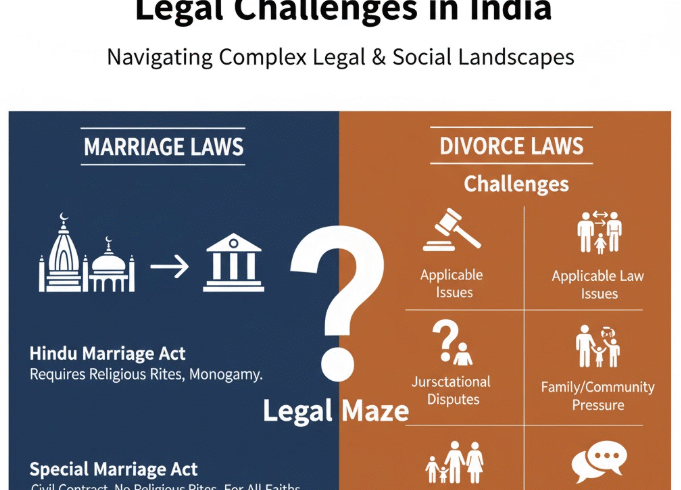Practical Guidance >> PRACTICE NOTES
I feel like you work hard all year, and then somebody tells you how much money to give away. Many people pay their taxes honestly, but some hide their income or seek unlawful ways to avoid paying. In India, not paying taxes isn’t just a matter of losing money — it can get you in serious legal trouble. But when does avoiding taxes become a crime? Let’s get deeper into this significant matter that affects millions of Indians annually.
The Thin Line: The Difference Between Tax Avoidance and Tax Evasion
But before we talk crime, it is important for you to understand that tax avoidance and tax evasion are two entirely different things. Here is the standard elaborated example: It is a little like, but not exactly like, taking a different route to school in order to avoid traffic versus storming through your neighbor’s backyard and jumping over his fence so you can get to school fast.
Tax avoidance is completely legal. It does not mean cheating to lower your tax burden. For instance, if you invest in tax saving fixed deposits or take a home loan, the amount of tax you pay will go down legally as long as you don’t exceed what’s considered appropriate by the government.
By contrast, tax evasion is criminal. It is an act of intentionally suppressing income, exaggerating expenditure or giving wrong information to the Income Tax Department. Here is where the law sets a firm boundary, and stepping past it can have profound repercussions.
Quick Fact: As per recent data, the Indian government is losing thousands of crores every year to tax evasion. This money could have been spent on schools, hospitals and roads that serve everyone.
How They Do It: How to Evade Taxes in India
You might evade taxes in quite a few ways. It is tempting to dismiss some of the schemes as so much hocus-pocus, but they are not all conjuring-tricks. The most popular methods people try are listed here:
Hiding Income Sources
This is maybe the oldest trick in the book. People get paid in cash for services or goods and they never declare the payments to tax authorities. This could be that a shopkeeper does not raise invoices for cash sale, or a professional is taking cash and not recording it in his books. At the time of 2016 demonetization, in fact, authorities found that many people had squirreled away sizable amounts of unreported cash at home.
Creating Fake Expenses
Business owners occasionally exaggerate what their costs were in order to have lower profits. They may overstate personal expenses as business costs, falsify receipts of purchases never made or list relatives on the payroll who are not actual employees. These bogus deductions improperly reduce taxable income.
Manipulating Financial Records
Some people kept two sets of account books — one recording the actual income (kept confidential) and another with lower income (shown to tax authorities). This practice, known as “dual books,” is entirely illegal and demonstrates unmistakable intent to defraud.
Using Shell Companies
More sophisticated evaders generate dummy companies that are only on paper. They send money through these companies to obscure the true origin and destination of funds. These shell companies may make fake transactions, loans or investments to transform dirty money into apparent legitimate funds.
Types of Tax Frauds in India:
- Cash Transactions: 75%
- False Expense Claims: 60%
- Dual Accounting: 45%
- Shell Companies: 30%
Percent of the cases based on data from Income Tax Department
What Indian Laws Say on Tax Evasion
India has good laws on the book to deal with tax evasion. The Income Tax Act, 1961 is the primary law in India that deals with income tax. The law has been amended numerous times to make it more difficult for people to escape their tax liabilities and easier for authorities to catch them.
The Income Tax Act Provisions
Section 276C of the Income Tax Act treats deliberate tax evasion. This section states that if a person makes an attempt to evade tax willfully, they could be punished harshly. The law examines whether the person knew he was committing a wrongful act yet did it anyway.
Section 276CC deals with people who fail to file their income-tax returns. If you’re required to file a return, and intentionally fail to do so, you can be prosecuted.
Section 277 speaks about false statement(s) in verification. When you sign your tax return, you are certifying that everything is true. If you knowingly give false information, it’s a criminal act.
Update: The Finance Act of 2024 has laid down sterner rules for monitoring high-value transactions and also raised penalty figures for deliberate non-compliance. The government is also employing artificial intelligence to identify suspicious patterns in tax returns.
For more detailed legal guidance on tax matters, visit Zista Legalis.
Penalty and Punishment — What Happens When You Get Caught
The penalties for tax evasion can be dire once it is unearthed. The penalty varies based on how much tax was evaded and whether it was a first-time infraction or suffered multiple.
| Tax Evasion Amount | Imprisonment | Fine |
|---|---|---|
| Higher than ₹10,000 but less than ₹1 lakh | 3 months to 2 years | Up to actual tax evaded |
| Higher than ₹1 lakh | 6 months to 7 years | 100% – 300% of the amount of tax |
| Second Offense | Up to 7 years | Up to 300% of tax evaded |
Warning: This is only the start of these penalties. In addition to being prosecuted criminally, evaders must pay the tax in question, along with interest dating from when it was due. The total amount (tax + interest + penalty) can often be three to four times the dollar amount of tax originally at issue!
Other Consequences Other than Money or Jail
But the consequences of tax evasion go beyond fines or time behind bars:
Permanent Criminal Record: A tax evasion conviction includes a permanent criminal record. This may affect your ability to get loans, visit specific countries or apply for government jobs.
Seizure of Assets: The IT Department can seize and auction your property (residential or commercial), including the house, car and business assets, for recovery of pending taxes.
Freeze Bank Accounts: Your bank accounts may be frozen, so you won’t be able to use direct deposits or other money in the account.
Business Impact: If you have a business, you will be ruined. No one will want to do business with someone convicted of tax evasion.
Professional Licenses: Doctors, lawyers and chartered accountants can lose their licenses to practice.
Real Cases: Tax Evasion Gone Wrong
But to look at some real cases is helpful for us to see how serious tax evasion really can be. While we can’t identify specific people, here are some examples of cases that have filled the headlines:
The Businessman Who Stored Crores in Cash
On occasions when they have raided places, the Income Tax Department has found hoards of cash and several crores hidden in secret compartments and lockers — even buried underground. The businessman was making bucket-loads of money for many years, yet never reported any of it. He kept sham books and paid employees in cash without adequate record. When he was arrested he was charged under numerous sections, fined heavily and imprisoned.
The Firm That Built a Shell Firms Web
One corporate group established dozens of shell companies to siphon off money illegally. They created bogus transactions between these companies, to convert black money into white. However, when police untangled this elaborate web, they discovered the group did not pay hundreds of crores in taxes. Criminal charges were made against the directors, and the company’s assets were frozen.
The Professional Who Did Cash Only
A high-income professional would sometimes take up to half his fees in cash, without ever declaring this income. They also took fake deductions for expenses that never occurred. During a survey by the Income Tax Department, it was unearthed that undisclosed income has been earned over the years. The professional was made to pay the back taxes with high fines and even threatened criminal prosecution for intentional evasion.

How the Government Finally Catches Up With Tax Cheats
You may be asking: With so many people in India, how does the government catch tax dodgers? The Income Tax Department has upped its game significantly. Things have indeed got tougher for tax evaders.
Technology and Data Analytics
The government now has sophisticated computer systems designed to automatically cross-reference all financial activities and compare it with your tax returns. These systems check:
- Your bank transactions, deposits of huge amounts and valuable ones
- Credit card spending patterns
- Property purchases and registrations
- Foreign travel and hotel bookings
- Investments in shares and mutual funds
- Business receipts
If your spending does not match what you have reported as your income, the computer system flags your case for investigation. So, for instance, if you project an annual earning of just ₹5 lakhs and purchase a property of ₹50 lakhs, then the system fills in the gap to ask how you could make such purchases.
Permanent Account Number (PAN) Tracking
For any financial transaction above a certain amount, you need to furnish your PAN number. This produces a digital trail that’s difficult to conceal. From purchasing gold jewelry to booking an international flight or investing in a property, your PAN is what ties it all together.
Information from Third Parties
The Income Tax Department gets data from banks, property registrars, stock exchanges and even foreign governments. As per international tax treaties, other countries also give information on bank accounts and investments of Indians held outside.
Surveys, Searches, and Raids
The department can do surveys at business premises or searches in homes and offices when they have evidence of tax evasion. Under the operations, officials can scrutinize books of accounts, interrogate people and seize documents and property.
New Law (2024-2025): Up-to-The-Minute Changes to the Tax Laws
The Indian government continues to amend tax laws to plug loopholes and simplify things for honest taxpayers. Here’s what you need to know about recent changes:
Simplified Returns for Small Taxpayers: To simplify the filing of returns for small taxpayers and to prevent inadvertent errors, the Government has introduced a new scheme called “Simplified Returns” which are simple return forms without any complex schedules.
The Faceless Assessment Scheme has been extended: That means a majority of tax assessments now occur with no face-to-face contact between taxpayer and authority. Everything is online, mitigating the risk of corruption and promoting transparency in the process.
Tighter Prosecution Norms: Lowering the threshold of prosecution. Even smaller cases of actual evasion can now result in criminal prosecution.
Tougher Penalty Regime: Increased penalties on different crimes. Not all mistakes are created equal: Now, there’s a dividing line between genuine errors and evasions, with heavier punishment for the latter.
High-Value Transactions Reporting: High value transactions have to be reported to the Income Tax Department. These include substantial cash deposits, buying land or property, travel to foreign countries and making major investments.
-
💼 Know your rights on GST refund disputes: The Rise of Legal Battles Over GST Refunds
The Right Way: How to Pay Taxes Honestly
Now that we know what not to do, let’s talk about how to get taxes right. Honest tax paying is not just about escaping punishment, but also demonstrating a commitment to the development of your country.
Keep Proper Records
Keep precise records of what you spend and how much money you bring in. Use digital methods and accounting software whenever it is an option. Keep all bills, receipts and bank statements organized. This contributes toward processing returns and is helpful in case you need to prove anything to tax officers.
Report All Income Sources
Don’t hide any income, no matter how small. If it’s a salary or business income, rental income, interest from savings or anything else, then everything needs to be reported. It is to be remembered here that the Income Tax Department already knows about most of your income through a variety of reporting mechanisms.
Claim Only Legitimate Deductions
The law allows a variety of legal deductions and exemptions. Use them wisely and honestly. Do not overstate or make up expenses. If you’re uncertain about what you can deduct, consult a tax professional at Zista Legalis.
File Returns on Time
Even if you are not required to pay any tax, file your return if your income is above the basic exemption limit. This avoids penalties and keeps the tax records clean. For individuals, the deadline is usually July 31 (though it can be extended).
Use Tax-Saving Investments Wisely
Instead of dodging taxes, invest in legal tax-saving instruments such as Public Provident Fund (PPF), Equity Linked Savings Schemes (ELSS), National Savings Certificates (NSC) and tax-saving fixed deposits. On the whole, these not only minimize your tax burden legally but also allow you to build wealth for the future.
Pro Tip: If you have erred on any of your previous tax returns, or if you have unaccounted for income, the Income Tax Department frequently comes out with voluntary disclosure schemes where you can pay off your taxes and a reduced penalty without legal consequences.
What to Do If You Get a Tax Notice
When you receive a notice from the Income Tax Department, it’s normal to feel scared. Here’s what you should do:
Read the Notice Carefully: Spend a few minutes reading what is actually stated in the notice. It’s possible it simply wants clarification or more documents.
Check the Deadline: Note the deadline by which you have to respond. Failing to meet deadlines can exacerbate the problem.
Document Collection: Gather documents in favor of your case, everything from bank statements to bills, receipts and proofs of investment.
Seek Expert Advice: If the issue appears to be complicated, employ a CA (Chartered Accountant) or tax lawyer. They can advise what the appropriate response is.
Respond Promptly: Don’t ignore the notice and hope it goes away. Get back within the timeframe they set, even if you have to ask for an extension to collate documents.
Be Straightforward: If you have made an error, admit it and make amends. The truth is usually more effective than trying to hide mistakes.
The Bigger Picture: Why Paying Taxes Is So Important
But there’s an even larger incentive to pay taxes honestly than the threat of legal repercussions. Each rupee that you pay in taxes goes for building the nation. Where your tax money is going:
Hospitals: Government hospitals, vaccination programs and health schemes for the poor are paid for by taxes.
Education: Public schools, scholarships and education offerings rely upon tax-generated revenue.
Infrastructure: Roads, bridges, railways and airports are paid for with tax money.
Defense: Our military keeping our borders safe is paid for by the taxpayer.
Welfare Schemes: Farmers, poor families and senior citizens are helped through programs which are funded by tax revenue.
And when someone avoids paying taxes, it’s not just that he or she is cheating the government — he or she is diverting resources from those fundamental services. It would mean fewer schools in villages, worse roads, and less aid for those who need it most.

Frequently Asked Questions
Is it possible for me to be sent to jail if I made a mistake on my tax return?
No, honest mistakes do not land one in jail. The legislation does differentiate between those who genuinely make errors and those trying to evade tax. If you made an honest mistake, yes, you may have to pay some penalty and the correct tax amount, but you will not be subject to criminal prosecution. But if you conceal income purposely or submit inaccurate information that you know is false, that’s when criminal charges apply.
What is the distinction between a tax notice and prosecution?
A tax notice typically is a request for information or clarification about your tax return. The overwhelming majority of those notices are routine and do not suggest any wrongdoing. Prosecution, however, is a criminal legal action being taken against you for severe violations such as willful tax evasion. Not all notices result in prosecution — only cases that involve intentional fraud and evasion generally do.
What is the level of tax evasion that is an offense in India?
Any intentional attempt to avoid paying taxes is, technically speaking, a criminal offense under Section 276C of the Income Tax Act. But when the amount of tax evaded is above ₹25 lakhs, the prosecution is mandatory. Below this amount, the department can apply its discretion to pursue prosecution if the evasion is of a nature or level of seriousness it considers requires prosecution. The crucial question is whether the evasion was intentional and willful.
Can the government access my bank account without a warrant?
Yes, under certain circumstances. The Income Tax Department has the power in law to seek details with respect to your bank accounts, particularly where they suspect you are avoiding tax. Banks are mandated to report large value transactions to the department automatically. But for more in-depth inquiries, the department typically has to give you proper notice and alert you through appropriate channels.
What if I neglected to report some income in previous years?
The better course is to voluntarily file an amended or supplemental return, if you’re in the allowed time frame. You could file a revised return in the same assessment year or file within two years from end of relevant assessment year by paying the tax. It is an act of good faith and may help avoid possible prosecution, among other things. If it’s too late, consider speaking to a tax professional for information about voluntary disclosure programs.
Is accepting cash for a service illegal?
It is not inherently illegal to accept cash as payment, but there are limitations and reporting requirements. Businesses and professionals can accept payments in cash, but transactions over ₹2 lakhs a day per person are banned. Most importantly, any cash that you receive needs to be accounted for and reported on your tax forms. Taking unreported cash as income and avoiding paying taxes on such income is tax evasion. It’s illegal to do so.
How long will it take for a tax evasion case in Indian courtroom?
Cases of tax evasion can take years to work their way through the court system in India, depending on the complexity of the matter and the tier of courts hearing it. Some easy cases can be settled within 2-3 years, and the few difficult cases have taken from 5 to ten or maybe even more years. That is why it’s better to follow the law on taxes from the beginning, rather than endure years of litigation.
If I’m prosecuted for tax evasion, will my family be liable?
The tax evader is the only one charged with a crime, but the family can suffer indirect consequences. If your assets are seized to recover taxes, it could impact property owned with family members. Even those not imprisoned subject themselves to social shame and bring upon their families a stain on reputations within the workplace or community. In addition, any relatives also implicated in the evasion or who benefited from it might be investigated.
Final Thoughts
Tax crimes involve real victims. It impacts every Indian by cutting down the resources available for development and public welfare. The distinction between legal tax planning and criminal tax evasion may seem murky, but it is perfectly clear — it’s the line between honesty and deceit.
It is now easier and less hassle to pay taxes properly in India, while the government is increasing enforcement too. The odds of being caught for tax evasion are higher than ever thanks to technology monitoring every major transaction. The issue isn’t whether you will get caught, but when.
When you pay taxes, remember — it’s not just a legal requirement but a civic duty. Each rupee you contribute genuinely goes a long way in building a better India. Whether it is a child enrolled in a government school, or a patient at a public hospital, or a soldier on the border, your taxes make things possible.
If you have messed up previously, there are ways to wipe the slate clean and start anew. The right time to begin doing the right thing is now. Stay upright, stay righteous, and hold your head high knowing that you are a responsible citizen who is doing your bit in making India stronger.
For comprehensive legal guidance on tax compliance and related matters, visit Zista Legalis





